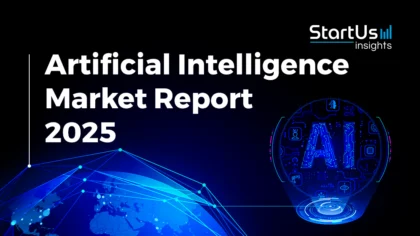Accelerate Productivity in 2025
Reignite Growth Despite the Global Slowdown
Following the virality of open-source models such as stable diffusion and OpenAI’s ChatGPT, businesses embraced generative AI (genAI) to automate various operational tasks. Innovations in multimodal generative models and deep learning-based neural networks drive these capabilities. Examples include generative adversarial networks (GANs), transformer-based models like GPT-3 and GPT-4, and Google’s BERT. These new classes of generative models achieve sophisticated results in numerous natural language processing (NLP) tasks. Major application areas for generative or synthetic artificial intelligence include hyper-personalization and intelligent process automation through text, image, video, and speech generation. Read more to explore how these trends impact your industry and operations.
This article was last updated in July 2024.
Innovation Map outlines the Top 10 Generative AI Trends & 20 Promising Startups
For this in-depth research on the Top Generative AI Trends & Startups, we analyzed a sample of 1292 global startups & scaleups. This data-driven research provides innovation intelligence that helps you improve strategic decision-making by giving you an overview of emerging technologies in the AI industry. In the Generative AI Innovation Map, you get a comprehensive overview of the innovation trends & startups that impact your company.
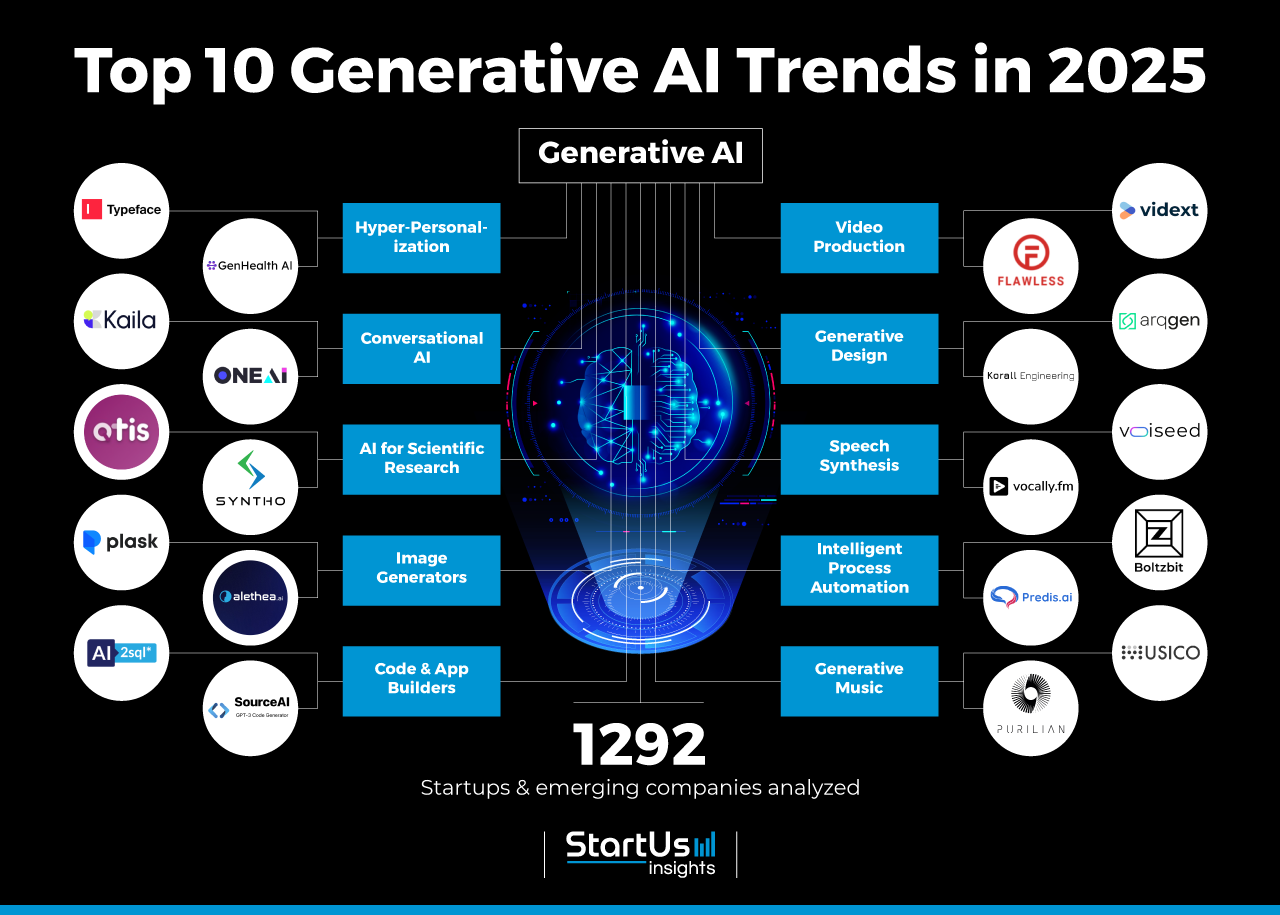
These insights are derived by working with our Big Data & Artificial Intelligence-powered StartUs Insights Discovery Platform, covering 4.7M+ startups & scaleups globally. As the world’s largest resource for data on emerging companies, the SaaS platform enables you to identify relevant technologies and industry trends quickly & exhaustively.
Want to explore all 1290+ generative AI startups & scaleups?
Tree Map reveals the Impact of the Top 10 Generative AI Trends in 2025
Based on the Generative AI Innovation Map, the Tree Map below illustrates the impact of the Top 10 Generative AI Trends in 2025. Task personalization is the major emerging trend in the use of generative AI. It is followed by conversational AI models and apps producing human-like responses. Additionally, large language models (LLMs) are advancing the scientific research and development of novel materials, biologics, protein engineering, energy, and climate-efficient products. Text, image, speech, video, code, and music generators are some of the most popular applications of generative AI, serving a variety of industries and purposes. Similarly, startups leverage algorithmic creativity to advance manufacturing, architecture, engineering, and construction (AEC) through generative 3D modeling. Lastly, generative intelligence is enabling intelligent process automation (IPA) and enables a new age of software robots.
Top 10 Generative AI Trends in 2025
- Hyper-Personalization
- Conversational AI
- AI for Scientific Research
- Image Generators
- Code & App Builders
- Video Production
- Generative Design
- Speech Synthesis
- Intelligent Process Automation
- Generative Music
Global Startup Heat Map covers 1292 Generative AI Startups & Scaleups
The Global Startup Heat Map below highlights the global distribution of the 1292 exemplary startups & scaleups that we analyzed for this research. Created through the StartUs Insights Discovery Platform, the Heat Map reveals high startup activity in the US, followed by Western Europe. Below, you get to meet 20 out of these 1292 promising startups & scaleups as well as the solutions they develop. These generative AI startups are hand-picked based on criteria such as founding year, location, funding raised, & more. Depending on your specific needs, your top picks might look entirely different.
Top 10 Generative AI Trends in 2025
1. Hyper-Personalization
GenAI utilizes advanced algorithms and language models to create personalized experiences based on the preferences and behaviors of individual audiences. These models are trained on large databases of various individual interactions, which then interact with the customers to deliver highly engaging experiences. Hyper-personalization, in turn, results in increased revenues, better outcomes, and reduced churn rates. GenAI-driven personalization in retail and marketing includes personalized product recommendations, content automation, and promotion customization. For this, AI models leverage data on individual preferences, purchase history, and browsing behavior. Similarly, synthetic AI in healthcare improves patient outcomes through treatment personalization based on patient medical history, symptoms, and genetic information.
Typeface AI facilitates Business Content Personalization
US-based startup Typeface AI provides an eponymous platform for business content personalization. Its AI takes prompts to create multimodal content including images, ad copies, blog posts, landing pages, job postings, and presentations. The platform integrates with existing enterprise applications and personalizes each content piece based on the audience, tonality, and specific brand own styles. Moreover, it provides AI models trained specifically to the brand’s framework to automatically ensure consistency and error-free content generation. The platform also provides customizable templates, built-in editing, and plagiarism checker tools, as well as dedicated content hosting. These features reduce the time and cost of new content generation for brands and streamline workflows for enhancing customer engagement.
GenHealth.ai offers Generative AI for Healthcare
Austrian startup GenHealth.ai provides healthcare solutions through generative AI. By training a transformer model on encoded claims and clinical data, GenHealth.ai predicts patient outcomes. The model acts as a digital twin or co-pilot, supporting use cases including health insurance plans to enhance the understanding of quality and risk and enable providers to identify optimal treatments. Additionally, the startup’s AI allows pharmaceutical companies to simulate clinical trials and facilitates personalized actuarial analysis for life insurance.
2. Conversational AI
Traditional or analytical AI-based conversational interfaces are limited to pre-defined commands and do not understand the query intention, resulting in subpar responses. Conversational AI solves this challenge by learning, understanding, and designing chat responses that are context and intent-driven. These generative model-driven chatbots and virtual assistants apply NLP, natural language generation (NLG), deep learning, and LLM. This enables intelligent virtual assistants, chatbots, and other conversational interfaces that interact with users in a human-like way. Further, startups develop applications based on OpenAI’s ChatGPT or similar conversational chatbots that take text or images as inputs to generate text. Such solutions automate routine customer inquiries, resolve common issues, and provide personalized support to improve customer satisfaction. Unlike retrieval chatbots, generative chatbots provide real-time contextual and intuitive outputs while addressing worker shortages in several industries. Besides, genAI-powered conversational bots expedite customer data analysis and extract insights to improve business processes.
WeBoard offers a No-Code Chatbot
Czech startup WeBoard develops Kaila, a no-code generative AI chatbot that utilizes deep neural networks without pre-defined decision trees. Businesses create multiple, need-specific, AI knowledge assistants using Kaila that seamlessly integrate with their systems. For this, companies upload text sources like company documentation, knowledge bases, and customer support tickets into Kaila Studio, its chatbot builder. Kaila then uses this information to update its pre-trained AI models and create ready-to-use AI chatbots. Moreover, it integrates with digital text sources to automatically track and retrieve business information changes and updates its AI models to provide up-to-date information. Businesses deploy these chatbots in their websites, mobile apps, and messaging platforms as well as build custom apps. This lowers costs for customer and employee support, business operations, and employee education by providing contextual, verbalized, and factual answers to queries.
One AI provides Large-Scale Language Analytics
Israeli startup One AI builds generative language AI APIs for business functions. Its analytics platform integrates data from multiple business sources, including texts, audio, and videos, to deliver actionable insights. The platform then leverages ML algorithms to identify trends in large data sets and cluster them based on themes, requests, questions, or complaints. Further, it automatically classifies incoming texts and performs pre-determined actions based on meaning-based search or large-scale language understanding. One AI’s platform thus enables businesses to create knowledge bases for generative LLM models as well as cluster and analyze sales conversations and customer support tickets. This improves decision-making, optimizes business operations, and increases efficiency.
3. AI for Scientific Research
LLM-based genAI tools accelerate the analysis of massive and complex datasets to generate insights and novel hypotheses across different scientific disciplines. Fields such as biology, chemistry, physics, and astronomy benefit from generative AI to develop accurate data models and produce reproducible results. This includes drug discovery, materials science, and energy research to environmental monitoring and applications in aerospace and transportation. For instance, genAI aids in identifying potential drug candidates faster and more accurately, reducing costs and improving patient outcomes. Startups develop genAI-powered platforms for the discovery and development of new materials with desired properties like increased strength and durability. In energy research, AI optimizes energy production, distribution, and storage systems to reduce carbon emissions. Additionally, genAI equips startups to produce synthetic data where real-world data or evidence (RWD or RWE) is limited or poses privacy issues, improving research accuracy.
Qtis AI enhances Medical AI Infrastructure
US-based startup Qtis AI provides AI infrastructure platforms with computer vision and natural language capabilities for healthcare settings. The startup’s generative AI-based QSx Platforms use various computer vision workflows to precisely identify and diagnose medical skin conditions. They also generate genetically accurate synthetic imaging datasets and let medical organizations connect their own datasets to train AI models. This allows healthcare and pharmaceutical companies to build, iterate, and test models quickly and reduce risks while reducing software development costs.
Syntho provides Synthetic Data for Research
Dutch startup Syntho builds Syntho Engine, a platform to provide synthetic data for research and development. It creates a synthetic data twin that imitates real-world data with minimal computing resources. The platform intakes any form of tabular data including time series data, large multi-table databases, and geographic location data, and supports all languages. The resulting synthetic data is statistically identical to the original input data while complying with general data protection regulation (GDPR) rules for preserving data privacy. Hospitals, pharmaceuticals, banks, insurance companies, and other medtech organizations use the startup’s platform to accelerate new product development.
4. Image Generators
Image generation or synthesis solutions increasingly leverage GANs or autoencoders. They create photorealistic and original artworks similar to existing human-created images. These generators range from text-to-image generation to image-to-image and speech-to-image generation. Image generators equip even non-professionals with sophisticated content-creation tools. Besides 2D photographs, advanced image synthesizers create 3D models and characters that find use in the gaming, fashion, marketing, entertainment, and media industries. GenAI startups also build algorithmic image creation software to automate the creation of non-fungible tokens (NFTs) and digital artworks. Such automated systems reduce the cost of physical prototyping and increase the efficiency of product development. Similarly, businesses use AI-generated characters as virtual fashion models and characters for movies, games, and other media. In marketing, image generators create personalized product images and advertisements for targeted and immersive advertising, increasing conversion rates.
Plask provides an Image Generation Platform
South Korean startup Plask builds a text-to-image and image-to-image generation platform based on stable diffusion. It offers a workspace where content developers give prompts for the platform’s AI, which generates dummy characters based on the provided description. The platform also enables perspective and pose adjustment of dummy characters and utilizes negative prompts to eliminate unrequired features from final renders. Moreover, it lets designers and creators input various image parameters and upload sample images to define image pose or context. This way, the startup’s platform accelerates 3D character development and unique image creation, reducing costs for the creator economy.
Alethea AI offers Intelligent NFTs
Singaporean startup Alethea AI provides a decentralized AI protocol that leverages generative AI models and blockchain to enable decentralized asset ownership. The startup’s CharacterGPT is a multimodal AI system that utilizes natural language text-to-character description to produce interactive AI characters. It tokenizes these AI characters and assets on the blockchain using proprietary Artificial Liquid Intelligence (ALI) Utility Token. The startup then leverages smart contracts to verify ownership, maintain the data sovereignty of asset owners, and enable character interoperability across decentralized apps (dApps). This empowers content creators and businesses to publish and monetize customizable intelligent AI characters as intelligent NFTs and trade them securely.
5. Code & App Builders
Automating software development workflows with genAI includes writing and testing code as well as building websites and apps. NLP-powered code generators expedite the software development, testing, and deployment time significantly. It allows non-technical teams and non-developers to carry out basic coding tasks without relying on developer resources. LLM and transformer-based generative models also enable code analysis and empower software upkeep and maintenance, reducing cybersecurity vulnerabilities. Likewise, startups build integrative genAI models to standardize code, reduce errors, and enable code translation between different programming languages. Code automation simplifies website building and mobile application development, reducing time to market for eCommerce and digital businesses. Lastly, NLP text-to-code software tools and AI models reduce software downtime and maintenance costs.
AI2sql makes an SQL Code Generator Tool
US-based startup AI2sql creates a genAI-powered tool to convert natural language queries into SQL codes. It converts questions written in plain English to SQL code for databases ranging from MySQL to MongoDB and Oracle PL. This allows software developers to select multiple tables and databases to generate code for data extraction, aggregation, storage, and viewing. Additionally, the platform supports the transformation of data definition language (DDL) files into SQL scripts according to the data models. Non-technical and non-developers team members use AI2sql’s platform to efficiently access databases and improve organization-wide coordination.
SourceAI creates a Text-to-Code Platform
French startup SourceAI develops a platform for generating code in any programming language. The startup leverages GPT-3 and Codex engines to enable one-click text-to-code generation, error detection, and debugging. This conversational AI-based code generator platform also responds to natural language inputs and explanations. Developers and non-developers use it to reduce development time, quality assurance, and debugging.
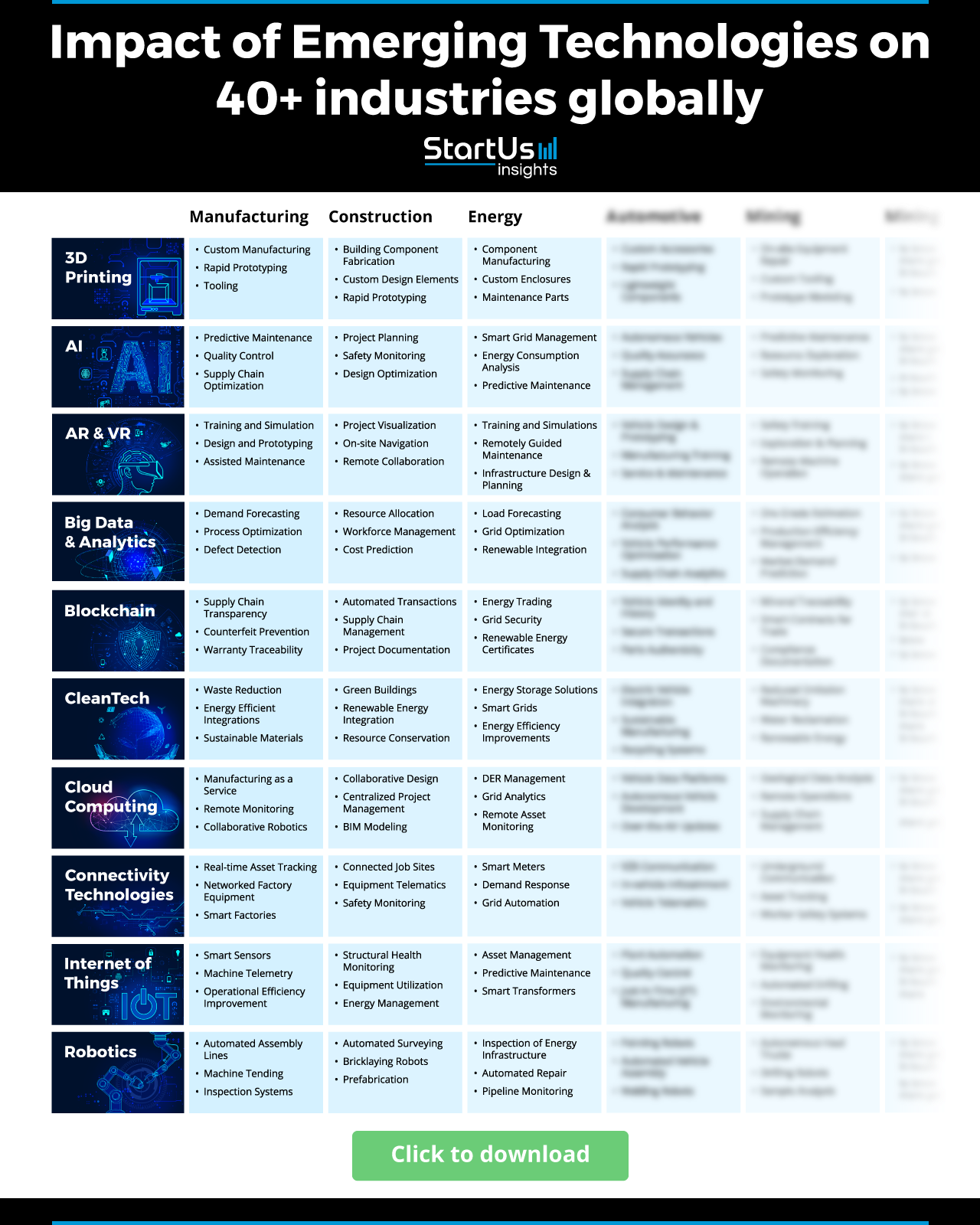
6. Video Production
AI-powered synthesizing of videos, animations, and gifs from scripting to editing save production resources for the media, marketing, advertising, and film industries. Algorithmic creativity provides realistic special effects, virtual environments, and character animations, which offer immersive viewer experiences. Startups develop computational automation to reproduce video content personalized to a wider global audience. This saves time and cost of resources required to produce similar content in different formats, languages, or contexts. Moreover, text, speech, or image-to-video enables rapid production of a variety of content. Some examples of AI-generated videos include product or service explainer videos, advertising campaigns for social media, or television broadcasting. Additionally, video enhancement, localization, and editing are other capabilities that synthetic media generation simplifies. GenAI startups also build models to analyze video and gather viewer behavior and sentiment data to improve content effectiveness.
Vidext enables Text-to-Video Generation
Spanish startup Vidext makes a video production platform using AI. It features text-to-video audiovisual synthetic content production without the need for cameras. The platform also offers custom templates for creating videos with 3D avatars or characters in forty languages. This web-based platform enables media and marketing businesses to create professional videos without actors or expensive equipment. Its multilingual feature also allows them to create videos that target a global audience. Businesses use the platform to generate engaging video content for internal communications, marketing, and sales campaigns, as well as training and eLearning.
Flawless offers GenAI-assisted Video Editing
UK-based startup Flawless creates TrueSync, a proprietary genAI software for editing videos. It utilizes neural networks to enable video modifications and generate cinematic photo-realistic outputs, thereby eliminating reshoots. The software also offers visual translation of the video in different languages with lip sync while preserving the performance of the original footage. Moreover, it supports performance transfer and editing from one shot to another, ensuring smooth scene transition coverage. It does so through the neural rendering of character faces during post-production and editing. Filmmakers and editors use this software to save the time and cost of reassembling the cast, crew, and infrastructure for reshooting.
7. Generative Design
Generative AI-based 3D design generators automate designing, simulation, and visualization while optimizing design constraints. This enables architects and engineers to generate multiple design iterations or improvements efficiently and model product customizations economically. To aid this, startups integrate generative models into their existing design tools for 3D modeling and rapid prototyping, which also reduces construction waste. Further, industries spanning semiconductors, aerospace, engineering, and manufacturing benefit from AI-powered production optimization and part designing. Generative designing of components and machinery factors in complex constraints like weight, durability, raw material, and strength, thereby optimizing production. In architecture, generative design produces building layouts based on energy efficiency and space utilization, improving building functionality and sustainability.
arqgen advances Generative Architecture
Brazilian startup arqgen develops and trains generative AI algorithms to build software solutions for multi-scale generative architecture. The startup’s solution, Arqgen Layouts, trains its AI models with the clients’ architectural manuals, design rules, and specific design styles. It then deploys this software in existing 3D modeling and designing software to automate architectural design by setting parameters. Further, the software regularly updates the AI models through continuous integration and delivery processes. Architecture firms, interior designers, and construction companies utilize it to generate residential, commercial, and corporate architectural layouts. This allows them to generate design iterations in a short period of time and optimize design elements as per quantitative and qualitative parameters.
Korall Engineering accelerates Industrial Component Designing
Norwegian startup Korall Engineering uses machine learning-based generative design tools for design-to-manufacturing optimization and custom product development. The startup automates workflows for industrial parts and component designing and creates multiple design options based on the design problem and constraints. Its generative design service also enables multiple parts consolidation using digitalization and additive manufacturing. This enables engineering teams to optimize application-specific product design and topology through lightweighting as well as defining structural strength and material. Architecture, manufacturing, and construction companies leverage the startup’s services to reduce material waste, fuel consumption, and carbon emissions, enabling them to achieve sustainability goals.
8. Speech Synthesis
Speech synthesis or text-to-speech (TTS) conversions empower voice assistants, chatbots, and other voice-interactive services. Such intent-driven responses reduce conversation dead-ends. They find applications in online education, entertainment, sales, marketing, and customer service. eLearning applications and human resource training teams use speech synthesis to produce interactive materials like audiobooks, podcasts, and online lectures. Similarly, startups utilize voice cloning to create realistic voiceovers and character voices for delivering immersive experiences for media consumers and gamers. Further, such solutions enable businesses to expand into new markets by generating speech in local languages. Generative AI startups build inclusive voice synthesis tools, such as screen readers, to assist speech and visually-impaired individuals. Moreover, genAI models analyze human speech to extract insights about the speaker’s emotions, improve response style, and drive customer engagement.
Voiseed enables Multilingual Voice Dubbing
Italian startup Voiseed provides REVOICEIT, a virtual professional multilingual voice dubbing platform for artists and content creators. It uses AI-powered speech synthesis to create original sound-alike voices in the target language. The platform also maintains speech consistency with respect to the original language dialogue while enabling pitch, prosody, and expression control. This facilitates natural-sounding speech generation in any of its supported target languages. Consequently, Voiseed enables media producers to reduce reliance on international artists for multilingual voiceovers and reduce content publishing time.
Vocally.fm facilitates Speech-to-Text Generation
Vocally.fm is a Luxembourg-based startup that provides a software-as-a-service (SaaS) solution for AI-generated audio content. The startup’s cloud-based platform offers website plugins with an integrated voice reader that enables AI text-to-speech reading of the website content. This unified reading and listening creates an engaging customer experience and improves user accessibility and inclusion. Moreover, it allows website owners and content creators to create voiceovers for videos, podcasts, audiobooks, customer support, and other multimedia content.
9. Intelligent Process Automation
Automation of repetitive business tasks, such as data entry, documentation, and invoicing, enables businesses to redirect their resources to complex tasks. Multimodal LLMs standardize and analyze unstructured and heterogeneous business data to deliver insights based on business rules and logic. Additionally, genAI algorithms enhance the capabilities of traditional AI models via NLU and image recognition. This enables cognitive automation and logical responses, addressing skilled worker shortages across industries. Workflow automation, predictive analytics, and intelligence resource allocation in response to human language are some examples of synthetic AI in robotic process automation (RPA). Sales and marketing automation, financial reporting, fraud detection, insurance claims processing, and supply chain management, are some industry-specific use cases of genAI-powered RPA solutions.
Boltzbit simplifies Workflow Automation
UK-based startup Boltzbit builds a platform to automate business processes and streamline workflows. It utilizes deep generative models that autonomously learn several tasks from user-uploaded and self-generated data. Moreover, the platform structures the unstructured data to operationalize data-driven task automation. Upon system integration, the platform automates routine business tasks such as portfolio optimization and prospect profiling in finance and banking. Similarly, it improves budgeting, forecasting, and user searches in the marketing, sales, and eCommerce industries.
Predis.ai facilitates Social Media Automation
Indian startup Predis.ai provides a social media content automation and strategy analysis platform. It features content idea generation, audience segment-wise video creation, and other content for different social media platforms. The platform also features tools for text-to-social media post creation, scheduling, copy generation, competitor analysis, and hashtag generation, among others. This, in turn, enables social media managers and marketing teams to analyze and automate social media strategies based on engagement and other parameters.
10. Generative Music
Startups develop music generators that compose original music based on listener preferences and styles to capture listener attention effectively. Generative music tools complement the composition process for musicians and artists as well as empower new artworks more efficiently and creatively. Further, they automate music production processes such as mixing and mastering while saving resources for musicians and producers. Wellness apps use generative music for creating personalized soundscapes that reduce stress and improve sleep and mood, enhancing therapy efficacy. Further, the gaming, films, and virtual reality (VR) sectors leverage genAI-based music generators to develop dynamic and immersive soundscapes. The advertising industry uses them to create unique and memorable soundtracks for commercials and brand campaigns. Likewise, this equips non-professional content creators and businesses with royalty-free music for use in videos and commercials.
MUSICO enables Autonomous Music Composition
Dutch startup MUSICO provides adaptive, real-time, copyright-free music generation. Its Musico engine is an AI-powered music composer that utilizes machine learning to generate music in different genres adapting to context. It enables both fully autonomous and semi-assisted compositions of melodies, beats, and harmonies. Moreover, MUSICO provides various apps that generate music in response to context, code, or gestures. Musico engine empowers musicians, media developers, and artists with real-time guided sound generation and auto-scoring to develop context-relevant music.
Purilian offers Interactive Music Compositions
Italian startup Purilian provides real-time AI-powered music compositions for marketing automation and customer engagement in retail stores. The startup’s generative AI algorithms create non-famous music to avoid customer attention diversion and, in turn, increase conversion. These algorithms produce unrepeatable music according to seasonality, environment, and store traffic. This eliminates the risk and penalties of reproducing unlicensed or unauthorized copyrighted music. Moreover, the startup’s solution enables retail shops, clubs, hospitals, and other commercial businesses to run personalized advertising messages in music broadcasts. This way, Purilian’s music streaming service simplifies the monetization of customer attention while improving conversion and revenue opportunities.
Discover all Generative AI Trends, Technologies & Startups
Startups are building explainable AI to make the decisions and outputs of generative models more transparent. Interactive AI models also facilitate human-machine collaboration through feedback loops and output adjustments. Moreover, quantum computing will improve the computational and processing speeds of generative models. However, unprecedented advances in generative AI give rise to deep fakes and the spread of misinformation. Therefore, startups are developing impactful applications that integrate human intuition and expertise while making these interfaces bias-free and accurate. The Generative AI Trends & Startups outlined in this report only scratch the surface of trends that we identified during our data-driven innovation & startup scouting process. Identifying new opportunities & emerging technologies to implement into your business goes a long way in gaining a competitive advantage.

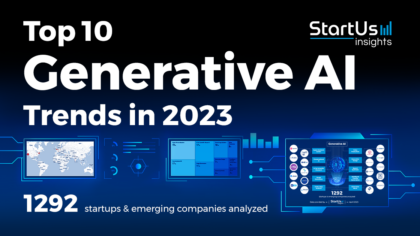

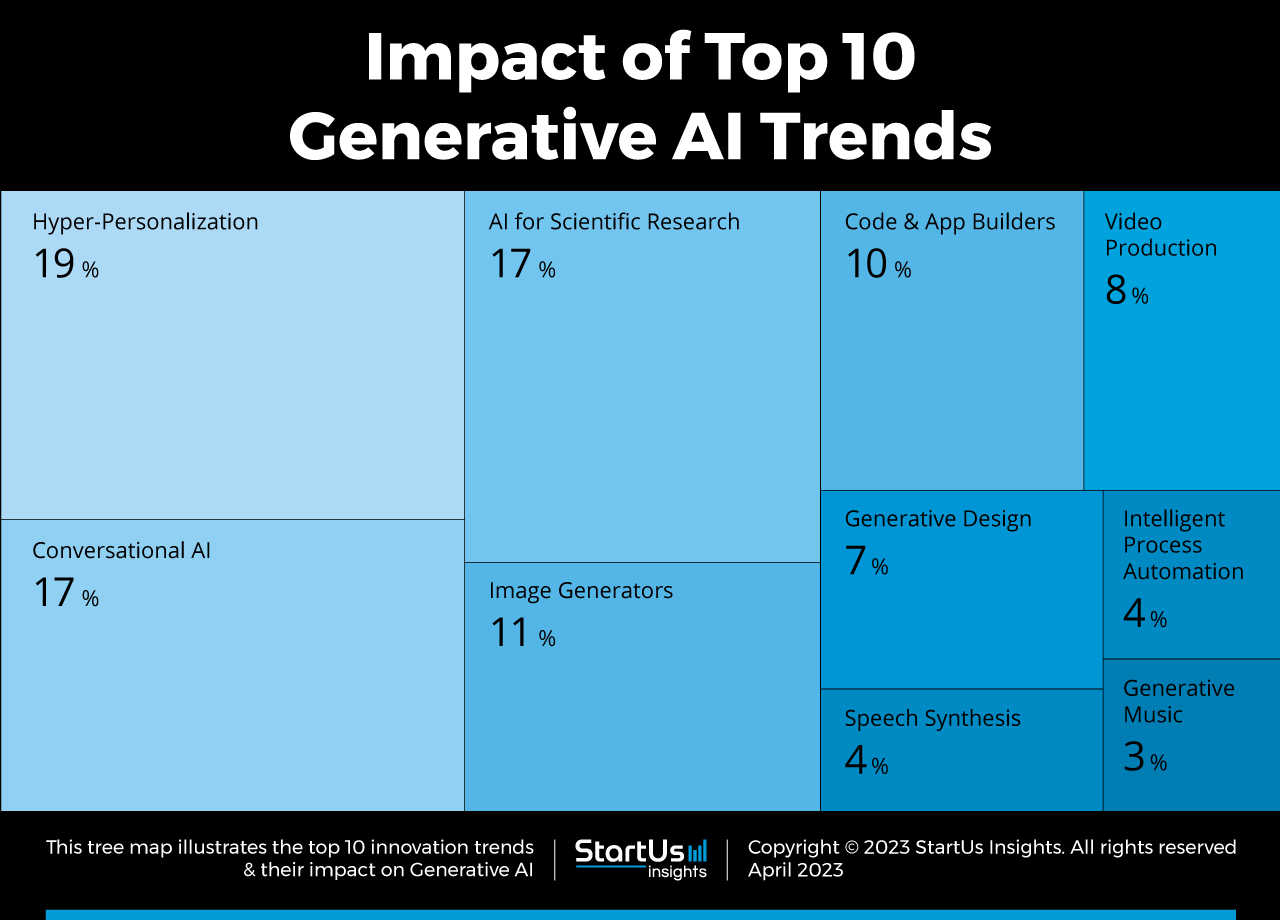

![10 Emerging AI Solutions for Material Science [2025]](https://www.startus-insights.com/wp-content/uploads/2025/06/AI-Solutions-for-Material-Science-SharedImg-StartUs-Insights-noresize-420x236.webp)
![10 Top AI Solutions for Telecom Operations [2025]](https://www.startus-insights.com/wp-content/uploads/2025/06/AI-Solutions-for-Telecom-Operations-SharedImg-StartUs-Insights-noresize-420x236.webp)
